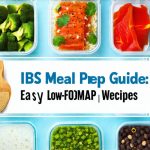The modern world often feels… chaotic. A relentless stream of demands on our time, attention, and energy leaves many feeling overwhelmed and disconnected. This constant state of stress doesn’t just impact mental wellbeing; it profoundly affects our gut health. The gut-brain axis is a well-established bidirectional communication system, meaning what happens in your mind directly influences your digestive system, and vice versa. When we’re stressed, our digestion suffers, potentially leading to discomfort, bloating, and even long-term issues. Finding ways to regain control, to create pockets of calm amidst the storm, becomes essential not just for mental clarity but also for physical comfort, specifically within our digestive systems. Understanding which symptoms call for a full gut panel can be a helpful first step in understanding your body’s signals.
One surprisingly effective tool for achieving this sense of control – and fostering gut health – is meal prepping. It’s often presented as a time-saving hack for busy people, and while that’s certainly true, its benefits extend far beyond convenience. Meal prepping isn’t merely about preparing food in advance; it’s an act of self-care that actively grounds us in the present moment and allows us to nourish ourselves intentionally. By taking charge of what we eat, and how we prepare it, we shift from reactive eating (grabbing whatever’s quickest) to proactive nourishment—a powerful step towards both mental and gut wellbeing. It provides a structured routine that can be incredibly soothing amidst chaos, allowing for mindful choices that support digestive comfort. You can explore meal simplification techniques for a happy gut to make this process easier.
The Grounding Power of Routine & Intention
Meal prepping creates a predictable structure within the often unpredictable landscape of daily life. This is particularly important for individuals experiencing anxiety or stress, as routine offers a sense of safety and control. When you know what to expect – not just that you’ll have a healthy meal, but what that meal will be – it reduces decision fatigue and mental load. That alone can lower cortisol levels (the stress hormone), which directly impacts digestion. High cortisol inhibits digestive processes, leading to issues like bloating, constipation, or diarrhea. A calm mind is more likely to result in a calmer gut.
Furthermore, the intentionality behind meal prepping sets it apart from simply grabbing takeout or relying on processed foods. It’s about consciously choosing ingredients that support your wellbeing and crafting meals with care. This act of mindful creation fosters a deeper connection with your food – understanding where it comes from, how it impacts your body, and appreciating the nourishment it provides. This isn’t just about avoiding problematic foods; it’s about embracing nourishing ones. Focusing on whole, unprocessed ingredients naturally supports gut health by providing fiber, prebiotics, and probiotics—the building blocks of a thriving microbiome. Learning how to find comfort foods for a sensitive gut can help you curate your ideal meal plan.
The act of prepping itself can be incredibly grounding. The repetitive tasks – chopping vegetables, measuring ingredients, assembling containers – can become meditative, drawing your attention to the present moment. It’s a form of active mindfulness that pulls you away from racing thoughts and anchors you in a tangible activity. This mindful preparation translates into a more enjoyable eating experience, as you savor each bite knowing it was prepared with intention and care.
Building a Gut-Friendly Meal Prep Foundation
Creating meal prep routines specifically geared towards gut comfort requires focusing on certain dietary principles. It’s not about restrictive dieting; it’s about making informed choices that support optimal digestion. Here are some key considerations:
- Prioritize Fiber: Soluble and insoluble fiber are essential for a healthy gut microbiome. Include plenty of fruits, vegetables (especially leafy greens), whole grains (like quinoa or brown rice), and legumes in your meal prep plans. Fiber feeds the beneficial bacteria in your gut, promoting diversity and regularity.
- Embrace Fermented Foods: Incorporating fermented foods like yogurt (with live cultures), kefir, sauerkraut, kimchi, or kombucha introduces probiotics – live microorganisms that contribute to a healthy gut flora. Start slowly with small amounts to assess tolerance.
- Focus on Whole, Unprocessed Foods: Minimize processed foods, refined sugars, and excessive fats. These can disrupt the gut microbiome and trigger inflammation. Opt for whole, natural ingredients whenever possible.
Consider starting with one meal prep session per week. Don’t try to overhaul your entire diet overnight; small, sustainable changes are far more effective. Begin by prepping just breakfast or lunch, then gradually add dinner as you become comfortable. Experiment with different recipes and find what works best for your taste preferences and dietary needs. Remember that consistency is key – even a little meal prep can make a big difference. Keeping a journaling as a tool for digestive self-awareness can help you track your progress and identify what works best for you.
Navigating Food Sensitivities & Intolerances
For many individuals, gut discomfort stems from specific food sensitivities or intolerances. Meal prepping allows you to take control of ingredients and avoid triggers, but it requires careful planning and awareness. It’s crucial to identify your individual needs – this might involve keeping a food diary, working with a registered dietitian, or undergoing allergy testing (under medical supervision).
Once you know your trigger foods, meal prepping becomes a powerful tool for managing symptoms. You can create customized recipes that exclude these ingredients, ensuring that every meal supports your gut health. This level of control is often difficult to achieve when eating out or relying on pre-made meals. For example:
1. If lactose intolerant, focus on dairy-free alternatives like almond milk or coconut yogurt.
2. If sensitive to gluten, choose naturally gluten-free grains and avoid cross-contamination during preparation.
It’s also important to remember that food sensitivities can change over time. Regularly reassess your dietary needs and adjust your meal prep plans accordingly. Listen to your body – pay attention to how different foods make you feel and modify your diet based on your individual responses. Don’t be afraid to experiment with substitutions and alternative ingredients. When in doubt, when to ask your doctor for a full gut check is always a good idea.
The Power of Batch Cooking & Smart Storage
Batch cooking is the cornerstone of efficient meal prepping, but it’s not just about making large quantities of food. It’s about streamlining the process and minimizing effort. Choose recipes that can be easily scaled up and stored effectively. Soups, stews, casseroles, and roasted vegetables are all excellent options for batch cooking.
Proper storage is essential to maintain freshness and prevent spoilage. Invest in high-quality airtight containers and label them clearly with the date of preparation. Divide meals into individual portions for easy grab-and-go convenience. Consider freezing some portions for longer-term storage, especially if you’re prepping larger batches. Freezing preserves nutrients and allows you to have healthy meals on hand even when you’re short on time or energy. Breath analysis as a quick checkup for the small intestine can help you monitor your gut health and adjust your diet accordingly.
Finally, don’t be afraid to repurpose ingredients. If you roast a large batch of vegetables, use the leftovers in salads, soups, or frittatas. This reduces food waste and maximizes your meal prep efforts. By combining batch cooking with smart storage strategies, you can create a sustainable meal prepping routine that supports both gut comfort and overall wellbeing.


















